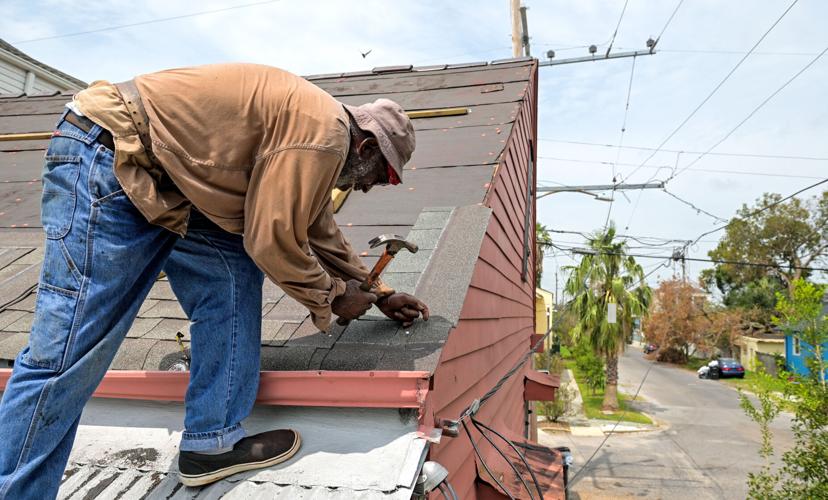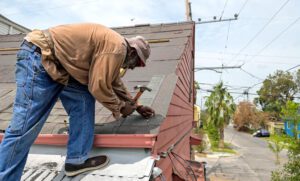How to Become a Roofer

Roofers do a variety of jobs, ranging from basic installation to repairing damaged roofs. Their duties include waterproofing, sealing, and protecting buildings from the elements. They can also protect swimming pools, tanks, and stone walls. Roofers use specialized tools and equipment to protect these structures. For example, they apply a damp-proofing compound to stone walls or apply a coating of asphalt or tar. They may also use hand tools, power fastening machines, and knives.

Roofing is a physically demanding occupation and requires a strong sense of balance and hand-eye coordination. The ability to follow directions and climb steep roofs is also essential. You should also have a love for the outdoors and working with your hands. You should also be able to work well with others. Strong communication and math skills are also necessary.
Most employers prefer to hire candidates who are at least 18 years old and are in good physical condition. Having a high school education is not required but is preferred. Taking courses in shop and mechanical drawing may also be beneficial. If you are interested in learning to roof, you should also try to enroll in an apprenticeship program.
As a roofer, you will have to work in teams. You must be physically fit and able to lift heavy objects. You must also be careful while working at heights. Moreover, you must be detail-oriented. A keen eye for detail is essential in this line of work, as you will have to match patterns and check for crevices.
Other skills needed for roofers include knowing how to set up and use roofing equipment safely. You should also be able to communicate effectively with your supervisor and report problems on the job. You should also have knowledge of different types of roofing systems and be able to use powered hand tools. Lastly, you should be able to lift heavy materials and safely set up scaffolding.
A roofer job description will include the specific skills necessary for the position. Roofers perform a variety of tasks, including installing, repairing, and inspecting roofs. They will also be responsible for identifying damaged parts of the roofs and preparing estimates for customers. The job description will also state whether you have to be physically fit, as roofers are often required to work on a very high roof.
A roofer can choose to work for several different employers. Their salary will vary depending on the type of projects that they work on. For example, roofers who work on commercial buildings will earn more than those who work on residential properties. Commercial roofers will lay out the roofs of commercial buildings, perform inspections during remodels, and recommend repairs and maintenance procedures.
While many locations have a high demand for roofers, there are some that stand out from the rest. For example, ranks near the top among all cities for roofer employment. Its high homeownership rate and high demand for repairs and replacements make it one of the most attractive markets for roofers. Similarly, it has a steady demand for roofing contractors and is also a hot market. It is also a hot spot for roofers, with its high homeownership rate and booming real estate market.
While Roofers are mostly employed by the Construction industry, other sectors also employ a significant number. Elementary & secondary schools employ 0.247 percent of Roofers, and Prefabricated wood buildings & mobile homes employ 0.214 percent of Roofers. According to the Bureau of Labor Statistics, Roofers earn an average salary of $36,167 per year. However, they are paid less than other occupations, such as industrial truck & tractor operators and food processing workers.
New state legislation aims to regulate roofers, who currently do not have to be licensed or registered in order to do business in the state. The bill, sponsored by Sen. John Carona, would require the state to license roofing businesses and register roofers with the Department of Insurance. This move is aimed at ensuring that roofers provide the best quality service for consumers while also protecting the public.
Licensed roofers may be required to have specialized training or experience and to have insurance or a bond. Some municipalities also require roofers to have permits and register with them. These requirements are usually simple to meet – typically, they require a completed application and a copy of general liability insurance.
Roofers should also be very clear about how they will be compensated. In an ideal world, all payments would be made upfront. However, in practice, roofers often operate on a credit basis. This means that roofers should be clear about the dollar amount they expect to be paid, when payments are due, and what happens if payment is delayed.
Licensed roofers are able to negotiate with insurance companies in their best interests. Contractors, on the other hand, are not legally allowed to negotiate with insurance companies. As a result, they serve their own interests. Unlicensed contractors are more likely to skimp on quality, inflate repair costs, or even skip town. Insurance companies cannot control the behavior of unlicensed individuals, making them a higher risk for a shoddy job.
